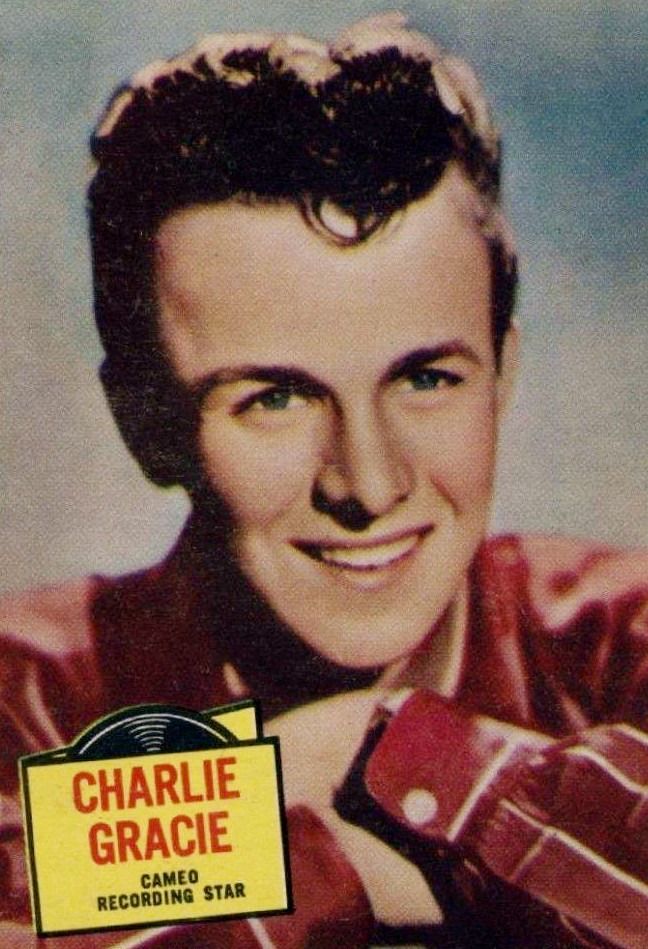Introduction to Charlie Gracie
Charlie Gracie (born Charles Anthony Graci in 1936, in Philadelphia, Pennsylvania) is an American rock and roll and R&B singer and guitarist, considered one of the earliest rock pioneers. Gracie’s earliest record was the popular song by Fats Waller, “I’m Gonna Sit Right Down and Write Myself a Letter” (with “Boogie Woogie Blues” as the flip side) that led Gracie to his first appearance on the pre-Dick Clark American Bandstand. Then he became part of the new Philly label Cameo’s first roster of artists. One of those songs he recorded and released on Cameo was “Butterfly.” It became Gracie’s breakthrough hit in 1957, selling over two million records. Charlie then released a follow-up “Fabulous” which was a good seller as well, and “I Love You So Much It Hurts” which became his last Hot 100 item. As a result he headlined many of the most prestigious events both in live concerts and on TV (that included The Ed Sullivan Show as well as American Bandstand, by now hosted by Clark). Gracie also toured the UK extensively between 1957-58. Among the audiences who attended his shows there were future stars The Rolling Stones, some members of the Beatles, Graham Nash and Van Morrison who were also considerably influenced by Gracie’s groundbreaking rock and roll style. Even as his chart successes began to fade, he still actively performed, having collaborated with Robert Gordon and producer Quentin Jones. He still enjoys a loyal fan base especially in Europe.
Charlie Gracie’s early years
Known mainly for his 1957 breakthrough hit “Butterfly,” American rock n’ roll pioneer Charlie Gracie was born Charles Anthony Graci on May 14, 1936 in Philadelphia, Pennsylvania. Through his father Gracie was encouraged to play the guitar when he was little. He began singing at clubs, private events, talent contests and television shows when he reached adolescence. Among of these appearances was in the Paul Whiteman show where he performed at the age of 16.
Gracie’s recording journey with “Butterfly”
In the early 50s music era, one Gracie’s material was heard by Graham Prince, owner of Cadillac Records where he eventually secured a contract. His first recordings “Boogie Woogie Blues” back with “I’m Gonna Sit Right Down and Write Myself a Letter” earned him an appearance on American Bandstand (pre-Dick Clark era). However in 1952, he switched to 20th Century Records and recorded several singles.
In 1956, the newly established imprint Cameo Records in Philadelphia found Gracie when they were looking for a talent. Shortly, Gracie cut the single “Butterfly” back with “Ninety Nine Ways” on a tight budget. Unexpectedly, the song became an instant hit in 1957, registering at #1 on the Billboard Hot 100, selling two million copies and gaining a gold disc. It was followed by another successful single “Fabulous,” making to the Top 20 of pop chart at #16. The follow-up singles “Wandering Eyes” (1957) and “Cool Baby” (1958) charted as minor US pop hits. However, these songs hit big in the UK at #6 and #26 respectively.
At the peak of his career, Gracie embarked on a tour with Bo Diddley, the Everly Brothers, Chuck Berry and Eddie Cochran who was Graci’s good friend. He also appeared on several hit shows of that time like The Ed Sullivan Show and American Bandstand and local shows such as the 500 Club in Atlantic City. As Gracie was becoming a prominent figure of the rock n roll scene, he was the American artist who introduced this musical style in the UK, headlining concerts at the London’s Palladium and Hippodrome.
Gracie continued to cut singles on a variety of labels (Roulette, Coral, Felsted and Diamond) but none of them were as successful as “Butterfly.” However, his songs were still making noise in European countries.
Gracie’s later career
By the late 1990’s, Gracie continued to perform as being a part of a rockabilly band produced by Lee Rocker, bassist of the Stray Cats. In the early 2000’s, Gracie was inducted into the Rockabilly Hall of Fame.
In 2011 Charlie recorded “Baby Doll” on his 75th birthday, along with other artists such as Gary Lefkowith. He released it as his first single in over half a decade to receive an airplay on the BBC. It earned a place on the Mediabase Top 40 Chart, mostly from repeated airplays at Sirius XM. The following year Charlie was inducted into the Broadcast Pioneers of Philadelphia Hall of Fame.

